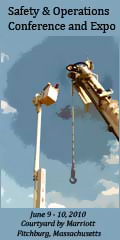NEPPA eNewsletter
January 2016
EXECUTIVE DIRECTOR'S REPORT
|
The mission of the Northeast Public Power Association is to assist its members by providing common services, facilitating the exchange of information and ideas, and solving mutual problems through cooperation and collective action.
As is clearly stated above, the mission of NEPPA is to use the combined strength of our membership to provide the services and opportunities that an individual member could not achieve on its own. Today, we address common needs such as lineworker training, safety classes, and our Public Utility Management Program. We convene conferences around Customer Service, Engineering and Operations, and others to facilitate the exchange of information and ideas. And both our advocacy in Washington and our mutual aid programs have helped to solve the shared problems facing community-owned electric utilities in the Northeast. As we turn the page to our 51st year of operation, we can all be confident in the knowledge that NEPPA is working every day to achieve its mission.
While NEPPA has been successful in meeting our mission in the current environment, we must also be aware of changing circumstances. At its CEO Roundtable in February, the American Public Power Association (APPA) will be highlighting three areas of disruption: the energy revolution, grid security, and global energy markets. Both the demand for cleaner energy sources and the emergence of electric cars are having a profound impact on the usage of electricity. The ongoing threat of ISIS and continued rise of cyber-terrorism raise concerns about our ability to protect the grid from physical and virtual attacks. Finally, the impact of a globalized energy market raises concerns about our national and economic security as well as the impact of geopolitics on energy prices. The APPA has recognized these as just a few of the many factors that are impacting the current and future landscape of public power in America.
In order for NEPPA to continue to deliver on its mission, it must have a plan for its future. Recently, Calvin Ames, NEPPA President, appointed a Strategic Planning Taskforce. Chaired by Jim Bakas, NEPPA First Vice President, this group represents a broad cross-section of the NEPPA membership and will work with the staff and an outside facilitator to begin drafting a strategic plan. Many of you will be asked to share your thoughts and opinions as we move through this process and I highly encourage you to do so.
Together we will set the course for NEPPA’s next 50 years.
##SHARELINKS##
|
AROUND NEW ENGLAND
|
It is with sadness and deep respect that the Massachusetts Municipal Wholesale Electric Company (MMWEC) marks the passing of James E. "Jim" Baker, who died on December 3, 2015, at the age of 94. As the 28-year manager of the consumer-owned Shrewsbury, Mass., municipal utility, Mr. Baker’s work as a public power advocate changed the course of history for Massachusetts municipal utilities and earned national acclaim. He spearheaded a legal and regulatory initiative in the early 1960s that led to a Federal Power Commission decision enabling municipal utilities to purchase power at wholesale from the region’s investor-owned utilities, yielding great benefits for municipal utility consumers.
Inspired by this victory, Mr. Baker went on to become a key figure in the creation of MMWEC, promoting the concept of joint action among municipal utilities and guiding the organization during its formative years. He was a founder of MMWEC, serving as the organization’s chairman from its inception in 1969 until 1983. Mr. Baker also chaired a public power committee that initiated and prevailed in federal litigation that gave municipal utilities the right to participate in the New England Power Pool and own pool-planned generation units.
Mr. Baker went on to national public power leadership roles, serving as president and a director of the American Public Power Association, where he received the prestigious James D. Donovan Individual Achievement Award as well as the Distinguished Service Award in 1984.
"James Baker was a tireless and true champion of public power whose work has and will continue to benefit consumers throughout the United States," said MMWEC Chief Executive Officer Ronald C. DeCurzio. "MMWEC was extremely fortunate to have Mr. Baker as a founder and advocate of joint action, and we express our deepest condolences to his family and friends upon his passing," he said.
A funeral mass was held on December 9 at 11 a.m. at Saint Mary’s Church, 640 Main Street in Shrewsbury. Burial with military honors was private. Donations can still be made in memory of Mr. Baker to Habitat for Humanity – MetroWest/Greater Worcester, 11 Distributor Road, Worcester, MA, 01605.
##SHARELINKS##
|
ASSOCIATION HAPPENINGS
|
The newly formed NEPPA Engineering Committee will be holding its kick-off meeting on March 16 at the NEPPA offices in Littleton. We would like to invite all engineers or engineering staff members working in the Public Power community to come and meet other engineers and share ideas and knowledge on industry related topics. Also at the kick-off meeting, we will be hearing from three industry experts on distributed generation coordination, flexible generation in volatile markets, and the use of drones in the electric industry. The Engineering Committee will present several times a year on various industry topics and at various NEPPA venues, so we invite you to come out and meet some of the other Public Power engineers and engineering experts. If you would like more information about the kick-off meeting please contact Ken Stone at kstone@beld.com or Kristin DiGirolamo at kristind@neppa.org. 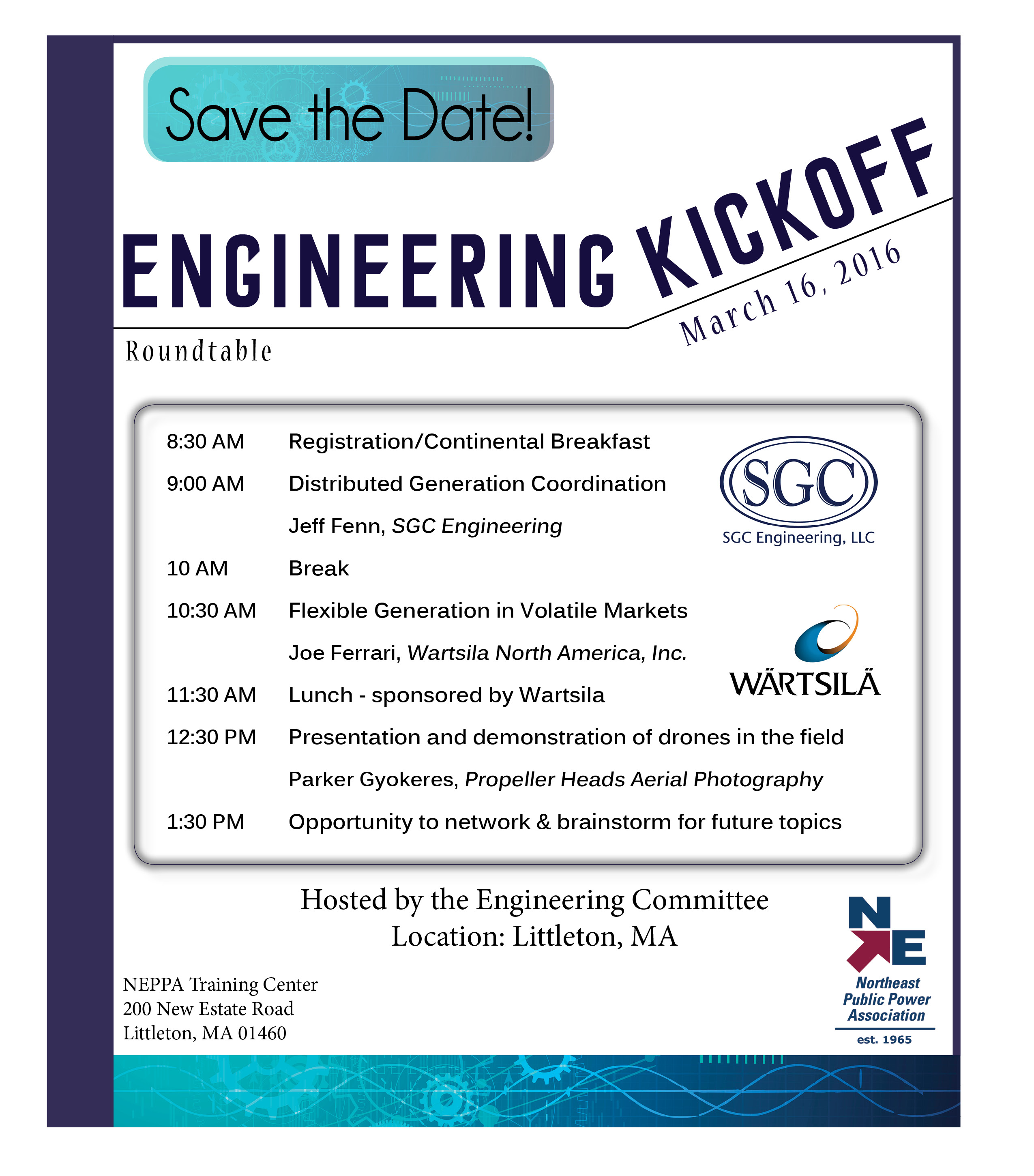 ##SHARELINKS##
|
CALENDAR
|
February 9
March 9
April 6
May 18
August 17
September 14
October 5
November 16
This 8-day program consists of safety in substations; AC/DC power systems; mathematics for sub techs; power transformers; batteries, cells, and chargers; intro to relays; intro to circuit breakers; intro to circuit reclosers; capacitor banks; intro to voltage regulators, and substation inspections. The class will be held at the NEPPA Training Center in Littleton, MA. Click here to learn more. ##SHARELINKS##
|
|
March 29 - April 1
April 12 - 15
May 3 - 6
May 24 - 27
This 16-day program will combine classroom instruction with hands-on, practical applications in the field. The class will be held at the NEPPA Training Center in Littleton, Mass., and in our new substation training area. Click here to learn more.
##SHARELINKS##
|
|
March 28
April 11
May 2
May 23 September 19
October 3
November 14
December 5 This 8-day program will provide an in-depth review of advanced metering concepts, technologies and applications for public power meter professionals.The class will be held at the NEPPA Training Center in Littleton, Mass. Click here to learn more.
##SHARELINKS##
|
|
September 20 - 23
October 11 - 14
November 15 - 18
December 6 - 9
This 16-day, one-year program builds on the knowledge and skills lineworkers already possess. Students are awarded a certificate in Advanced Lineworker Skills. The classes will be held at the NEPPA Training Center in Littleton, Mass. Click here to learn more.
##SHARELINKS##
|
|
January 15
February 8
February 29 March 21 This 4-day program will cover: metering safety, an intro to metering, mathematics for metering personnel, demand metering, basic electrical circuits, basic electrical theory, self-contained versus transformer rated meters, and an intro to solid state meters.The classes will be held at the NEPPA Training Center in Littleton, Mass. Click here to learn more.
##SHARELINKS##
|
EDUCATION & TRAINING UPDATE
|
On December 7, 2015, the NEPPA Safety Trainers assembled in Littleton, Massachusetts at the NEPPA Training Center for their annual meeting. The first topic of the day was to introduce NEPPA’s new executive director, David White. One other item discussed was the frequency that each utility should provide CPR/First Aid training. It was agreed that this subject falls under the same category as Pole Top Rescue and Enclosed/Confined Space Rescue and would be required annually.
The bulk of the day was spent by the group working with Jonathan Dost, NEPPA’s IT Consultant setting up email and the new iCloud system for storing the training department programs.
All of NEPPA’s trainers, Bob Henriksen, Lou Gabriele, John Jankowski, Linda Calderiso, and Pete Crowley (Bill Hesson was absent conducting a safety training session) once again committed to conducting the highest quality training possible recognizing the importance of training line workers to work in the safest manner possible. All agreed that one aspect of a good safety meeting is to have all participants involved and to eliminate any type of distractions, such as side discussions that may not be related to the topic being discussed. Also, it was recommended that managers and supervisors attend safety meetings!
As an organization, NEPPA is truly fortunate to have such a dedicated team of people who take their job so seriously and it's a privilege for me to work with this group who care so deeply for the people they are trying to assist to "go home at the end of the day...safe!"
Steve Socoby
NEPPA Director of Training
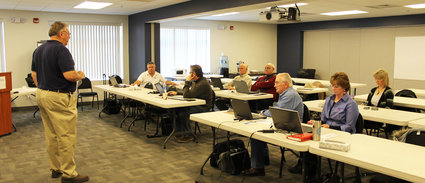 ##SHARELINKS##
|
|
Graduates included:
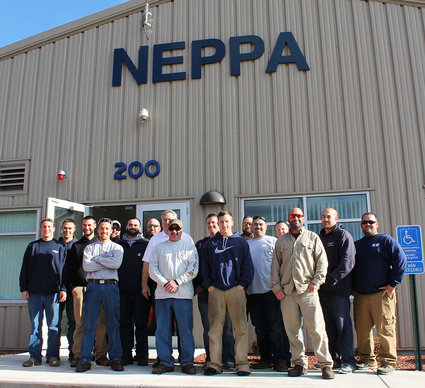 ##SHARELINKS##
|
|
On December 18 NEPPA held the last class for 16 Substation II Technicians. Most of the participants in this class had previously completed Substation I in 2014 and had come back to finish a more advanced training session covering all aspects of substation work. Substation I covers mostly theory and introductory level training that includes Power Transformers, Relays, Circuit Breakers, Batteries and a host of other subjects relevant to substation work. Substation II is much more hands on type training and also uses many of NEPPA’s affiliate members to aid in the learning experience. Experts in the substation field are brought in to expose the students to the latest in testing equipment and procedures. For example, Omicron sent two experts, one in Power Transformer testing and another in Circuit Breaker testing, with their latest test sets on display. Robert Brown and Ron Pellegrini came from Danvers Electric with their relay test set. They brought a few relays and the class was able to witness the set up and then test relays right in the classroom. A Print Reading session had to be cancelled due to scheduling conflicts but will be added to all substation training classes in the future. Those sessions were extremely informational and invaluable to each class participant. NEPPA would once again like to thank all of those affiliate members that provided experts and also our own member utilities for sharing their experts for the enhancement it brought to our substation training classes. This class, perhaps as much as any class NEPPA has ever conducted, was able to network very well with each other. Those relationships will prove to be valuable as they face problems and difficulties at work in the future and now have others that may be called upon for assistance. Due in large part to the interest in this class and that of several utility managers, NEPPA is contemplating developing a comprehensive four-year Substation program in the near future to provide the best substation training possible. Graduates include:
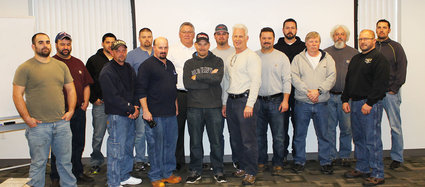 ##SHARELINKS##
|
LEGISLATIVE UPDATE
|
In This Issue:
Congress Passes Tax and Spending Bill
Before adjourning for the holidays, Congress passed, and the President signed, a $1.8 trillion package of tax cuts and allocations to fund the federal government and programs FY16. The spending bill does not contain policy riders threatening top Administration regulatory priorities such as the Clean Power Plan or Clean Water Rule (also known as WOTUS) or superseding the regulation for coal combustion residuals.
Of interest to electric utilities, the "Cybersecurity Information Sharing Act (CISA)" (retitled the Cyber Security Act) was included in the omnibus package, including technical fixes to definitions and disclosure language advocated by the electric sector. The final text also omits reference to a Department of Homeland Security report on mitigation strategies that industry believed would undermine the voluntary nature of the bill – the Sec. 407 Collins (R-ME) amendment that was in the Senate version of the bill.
The bill also includes a five-year extension, modification, and phase-out of the Investment Tax Credit (ITC) for solar power and the Production Tax Credit (PTC) for wind and other renewables. The tax bill extends the PTC as-is for two years, and the spending bill provides 80% of credit value for 2017; 60% for 2018; and 40% for 2019. The 30% temporary ITC would be extended for three additional years (from its current Dec. 31, 2016 expiration), and would then be phased out with a 26% credit for 2020 and a 22% credit for 2021.
The Low Income Home Energy Assistance (LIHEAP) program is funded at $3.39 billion. The Northeast Home Heating Oil Reserve program will receive $7.6 million.
To read the complete legislative update including the following topics, click the links below:
##SHARELINKS##
|




